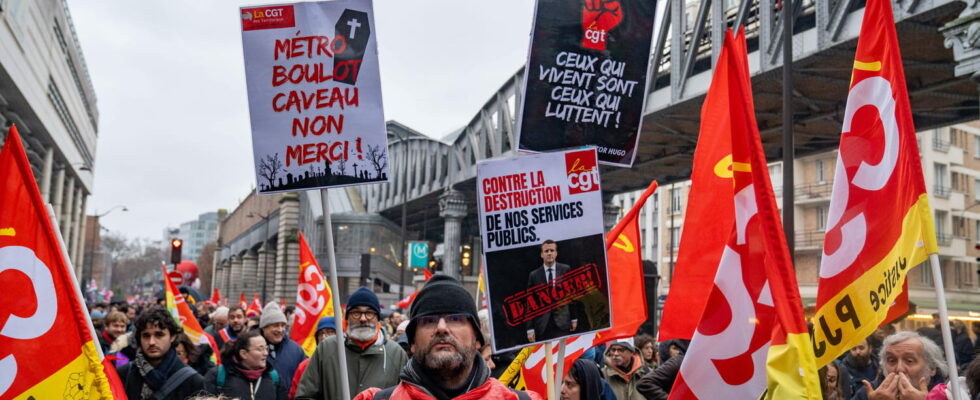After the civil service, several other mobilizations are planned in the days to come. Farmers and SNCF agents will be on the front line.
During the month of December, the mobilization dates follow one another. A major strike movement led by public service unions took place on December 5. This mobilization brought together 200,000 people in 160 processions in France according to the CGT and 130,000 according to the authorities. 18.61% of public sector employees out of 2.5 million went on strike, according to the Ministry of Civil Service. The majority came from National Education, so schools were closed. This rate of agents on strike in the state civil service was almost three times higher than that recorded during the last mobilization for salary increases in March.
Farmers, mobilized since November 18, will accelerate the movement, having announced new mobilization dates. The SNCF, for its part, launched a strike on November 21 and this could quickly resume for an indefinite period. Here is the calendar of the next mobilizations.
December 9 and 10: the return of the farmers
The FNSEA announced a new series of mobilizations on Monday December 9 and Tuesday December 10. Friday November 29, at the microphone of RMC, the president of the first agricultural union, Arnaud Rousseau, added that they will be done “around income, around the relationship with the price of our products, particularly in the context of the start of relations sales, negotiation with distributors”.
The movement therefore continues while the mobilization of farmers began on November 18 after the call from the FNSEA and the JA, the majority union alliance. They denounce in particular their working conditions as well as the free trade agreement with Mercorsur. Rural Coordination joined the movement on November 19 with more substantial actions, notably the blocking of certain roads such as the A9 between Spain and France and the blocking of purchasing centers. The mobilizations of farmers are diverse: filter dams on the roads, occupation of roundabouts and roads, “fires of anger”, mobilizations in front of the prefectures with dumping of manure or waste and other more substantial actions such as blockades of roads and purchasing centers, controls of goods. On November 28, they attacked public institutions, including Anses and Inrae, by erecting symbolic walls in front of their entrances.
On the same dates, a strike will also take place in all ports, announced by the National Federation of Ports and Docks CGT. They denounce risks linked to asbestos and want negotiations on salaries. This strike could affect “loading and unloading” activities.
December 11: start of a renewable strike by the SNCF?
The SNCF inter-union called for an indefinite strike from December 11, in response to the confirmation of the dismantling of Fret SNCF on January 1 and to denounce the opening to competition. The CGT and Sud-Rail are maintaining their call for a strike, even if the threat of a renewable strike every 24 hours on SNCF trains is receding. Already on Thursday, November 21, the strike movement was barely followed. According to the CGT union, only one in four railway workers was on strike that day.
“The French don’t want this strike at Christmas, we understand them, and above all there are no reasons,” Jean-Pierre Farandou, CEO of SNCF, also declared on RTL. “I am quite doubtful about this social movement, especially since there are no other possible hypotheses” than this dismantling, announced the Minister for Transport François Durovray.
According to information from RMC, Unsa Ferroviaire, the second largest railway union, has, for its part, decided to abandon the mobilization, after the signing of two agreements concerning the working conditions of Freight agents. The CFDT could align itself with this position. If the movement is poorly followed, the disturbances could be very localized. They will be known 48 hours before the start of the movement.
December 12: mobilization of employees
The general secretary of the CGT, Sophie Binet, called on employees to go on strike on December 12. They are called to mobilize in front of factories and prefectures. The objective: to fight against layoffs. “We are now calling on employees affected by the layoff plans to go on strike and occupy their factories,” Sophie Binet declared at a press conference. The CGT also encourages “employees to take action to defend employment and industry”, denouncing the proliferation of social plans in recent weeks in France.
For their part, the Sud Education 44 and FSU 44 unions also called for a new movement, which could last three days, on December 10, 11 and 12, with a national call in particular on the 12th. Julie Barbaux, of Sud Education 44, teacher at the Nelson-Mandela school in Saint-Herblain assured during the demonstration on December 5 that “it is the right time to mobilize and send a message: the new government will have to bring a budget which provides resources to public services. This proposal was presented at the general meeting this morning and is currently being discussed with the inter-union. The Force Ouvrière organization has, for its part, planned “three days of strike for three days of waiting”, for December 11, 12 and 13.
